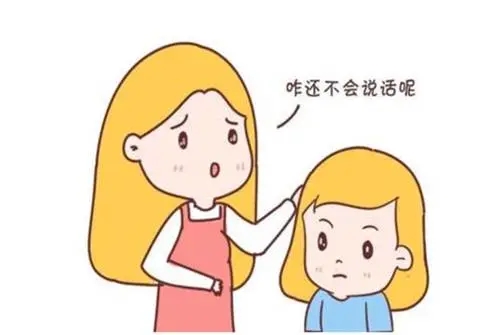这是 达医晓护 的第 2877 篇文章
什么是语言发育迟缓?
 语言发育迟缓是指儿童在语言理解能力或口头表达能力方面有困难并明显落后于同龄儿童的正常发育水平。儿童语言发育迟缓这已经成为2岁时最常见的发育性问题之一,国内外报道发生率约为15%,其中的50%的孩子在3-4岁时语言发育会达到正常范畴。
语言发育迟缓是指儿童在语言理解能力或口头表达能力方面有困难并明显落后于同龄儿童的正常发育水平。儿童语言发育迟缓这已经成为2岁时最常见的发育性问题之一,国内外报道发生率约为15%,其中的50%的孩子在3-4岁时语言发育会达到正常范畴。
语言发育迟缓的孩子可能会在以下几方面出现困难:
•理解单词或句子困难。
•说出第一个单词或学习单词
•积累的词汇量少
•把单词拼凑在一起构句有限,表达简单
研究发现,大约有50%表达性语言迟缓的孩子不能自发地解决自己的问题。而且有相当比例的孩子会因为语言的障碍,出现认知,读写,沟通,社交参与,行为方面问题,特别是感受性语言迟缓的儿童。
 语言发育迟缓的原因是什么?
语言发育迟缓的原因是什么?
有些孩子语言发育迟缓与听力障碍,孤独症,发育迟缓,智力障碍,或缺乏良好的语言交流环境有关。但很多情况下大多数孩子语言发育迟缓的原因和发病机制不明,研究发现可能与遗传因素或生物学上大脑的功能和结构的差异有关。孩子除了语言发育落后外,其他运动发育,神经系统发育或感觉认知发育都是正常水平。语言发育迟缓多见于男孩,常有家族遗传史, 可能在较亲近的家族成员中有语言发育迟缓或交流障碍的病史。
 怎么识别语言发育迟缓
怎么识别语言发育迟缓
每个孩子的语言发展速度不同,只要在正常范围内,允许有一定的快慢不一。所以,把孩子和其他同龄儿童进行比较,也许不能帮助我们知道孩子到底是“贵人语迟,大器晚成”呢,还是存在有语言发育迟缓。如果是后者的话,需要及早发现问题及早治疗,以免错过语言发育训练的最佳时期。那么我们到底怎么判断呢?在什么时候需要去寻求医生的帮助呢?
让我们一起来看以下的警示信号,如果在孩子不同年龄段发现以下任何迹象,最好是要尽早考虑找医生给予专业的判断以及建议。
6月龄
没有发出「咕咕」的声音或其他声音
10月龄
没有咿呀学语,对叫他名字没反应
12月龄
孩子没有尝试用声音、手势等非语言目的的信息或语言表达与你交流,尤其是在需要帮助或想要什么的时候。
15月龄
理解的单词少于3个
不理解简单的问句。比如“妈妈在哪里?”
听到“不”不会停止
18月龄
不理解简单的指令。比如“穿上鞋”。
24月龄
词汇量少于30-50个
不会说2个字或2个字以上的短语。比如,“妈妈抱”
不会自发性地说话,而是从别人那里鹦鹉学舌复制单词或短语
看上去似乎不理解简单的指令或问句。比如“把你的鞋子拿过来”,“要喝水吗?”或者“妈妈在哪里?”
30月龄
男孩的结构表达量少于3个,女孩的结构表达量少于5个。结构表达是指短语或句子,比如形容词加上名词“大苹果”,名词加动词“宝宝要吃”
3岁
不会说较长的短语或简单的句子。比如“妈妈帮我”或“还要果汁”
听从简单的2步指令或问题有困难。比如“把鞋子拿过来放进盒子里”或“今天你午饭想吃什么?”
不会问简单的问题。比如“你在做什么?”
对书籍不感兴趣
随着年龄增长,语言发育迟缓的儿童常表现为:
学习新单词以及进行对话有困难,词汇量及词汇多样性低于预期
使用的句子过短而简单,并经常省略句子中的关键词
构句使用语法和时态有困难,特别是过去时态
对于给出的长指令,只会回应部分
词汇提取困难,说话时很难用对正确的词;同义词,多义词,双关语的理解力缺陷
可能不理解单词、句子或故事的含义
讲述有条理的简单故事和叙事能力不足
除了在语言和交流方面的表现,语言发育迟缓的儿童因为语言能力的欠缺,可能会影响学业,出现学习困难。另外,也可能会有行为问题,比如不喜欢社交,注意力不集中,攻击性行为,情绪波动等等。所以对于说话晚的宝宝,一定要及早引起重视,到医院进行评估检查,早干预早康复。
What is a language delay?
A language delay is when a child has difficulties understanding and/or using spoken language. These difficulties are unusual for the child’s age.
The difficulties might be with:
·understanding words or sentences.
·saying first words or learning words
·building vocabulary
·putting words together to make sentences
Some language delays are associated with conditions like hearing impairment, autism spectrum disorder (ASD), or developmental delay and intellectual disability. Many happen on their own.
Causes of language delay
Some language delay is related with hearing impairment, autism, developmental disorder, intellectual impairment, or environmental factors. However, we don’t know what causes language delay in most cases. But we do know there’s likely to be a genetic or biological component. That is, language delay might run in families. Language delay is more likely for boys and children who have a close family member with a history of a language delay or communication disorder
How to identify language delay
Children develop language at different rates. So comparing your child to other children of the same age might not help you to know whether your child has a language delay or ‘late talkers’. It’s best to seek professional advice if you see any of the following signs in your child at different ages.
By 6 months
Child isn't trying to talk to you in ‘coos’ and other sounds.
By 10 months
No babbling or no responding to his name when called
By 12 months
Child isn’t trying to communicate with you using sounds, gestures and/or words, particularly when needing help or wanting something.
By 15 months
Child doesn’t seem to understand simple questions – for example, ‘Where’s Mummy?’
By 2 years
·isn’t saying about 30 to 50 different words
·isn’t combining two or more words together – for example, ‘Mum up’
·isn’t producing words spontaneously – that is, your child only copies words or phrases from others
·doesn’t seem to understand simple instructions or questions – for example, ‘Get your shoes’, ‘Want a drink?’ or ‘Where’s Mummy?’
At about 3 years
·isn’t combining words into longer phrases or sentences – for example, ‘Help me Mummy’ or ‘Want more drink’
·doesn’t seem to understand longer instructions or questions – for example, ‘Get your shoes and put them in the box’ or ‘What do you want to eat for lunch today?’
·isn’t asking questions – for example, ‘What are you doing?”
·takes little or no interest in books.
Children with developmental language disorder:
·struggle to learn new words and make conversation
·use short, simple sentences, and often leave out important words in sentences
·struggle to use past, present or future tense the right way
·respond to just part of an instruction
·find it hard to use the right words when talking
·might not understand the meaning of words, sentences or stories.
作者:澳大利亚墨尔本大学医学院儿科博士
百汇医疗(中国)儿科医师
蒋本然




 扫码下载APP
扫码下载APP

 科普中国APP
科普中国APP
 科普中国
科普中国
 科普中国
科普中国